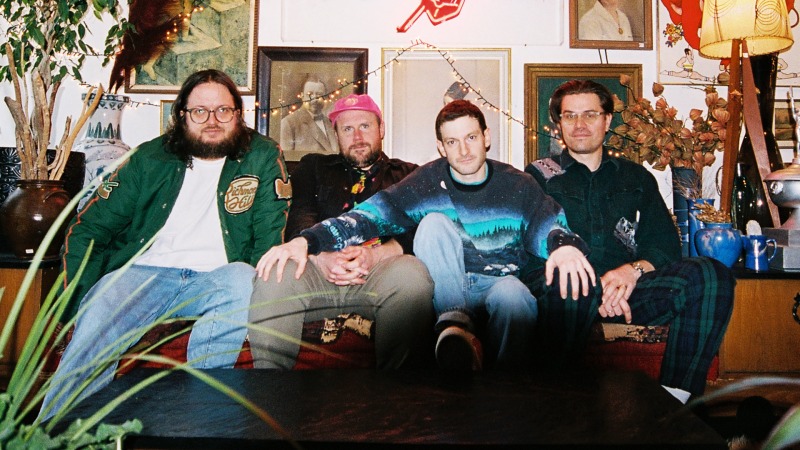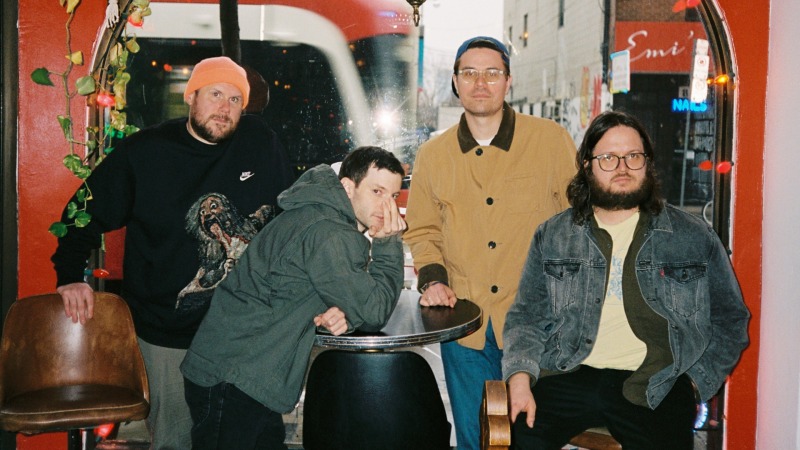PUP Embrace Their Imperfections
Vocalist Stefan Babcock talks to Paste about how writing songs in isolation saved him from self-destruction, why he and his bandmates can’t get along in the studio, and the Torontonians’ new album, Who Will Look After the Dogs?
Photos by Vanessa Heins
After 15 years as a band, you would think that PUP has its shit together. But for the Toronto band, the chaos is not only part of the appeal, it’s integral to their story. Stefan Babcock, Nestor Chumak, Zack Mykula, and Steve Sladkowski have made a living fighting with each other while churning out explosive, hotwired pop-punk albums. They’ve built an arsenal of singalong bangers, like “Kids,” “DVP,” “Waiting,” and “Reservoir.” Their songs are neurotic, funny, and nihilistic, with a hint of self-deprecation and middle fingers—as if to say, “Yeah, we’re fucked up, but we’re no more fucked up than you.”
PUP’s last album, 2022’s THE UNRAVELING OF PUPTHEBAND, was their most bombastic and colorful yet (I mean, just look at that ridiculous cover art), in which the band imagined themselves as a corporate entity, wondering out-loud: What would it be like to press the self-destruct button on an entire enterprise? The thing is, they’ve had their hands all over that self-destruct button since 2010.
A decade ago, on The Dream is Over, PUP could barely stand the sight of each other, singing together (or, at each other) in perfect harmony on the opening track: “If this tour doesn’t kill you, then I will. I hate your guts and it makes me ill seeing your face every morning.” It’s shocking that PUP hasn’t fully imploded by now. But the band lives on and their fifth album, Who Will Look After the Dogs?—a phrase Babcock wrote down during a post-breakup hell in 2022—is them at their most earnest and imperfect.
When I meet with Babcock in April over Zoom, he’s a bit jittery about things picking up again. For the better part of a year following the UNRAVELING tours, he spent his time alone in a cabin in Northern Canada, isolated from friends and family, with nothing to do but listen to hockey podcasts and write songs. “I was living in a house without another person for the first time in my whole life, living completely on my own for the first time in my whole life,” he reflects. “I used songwriting as a way to keep me on track. I was writing more than I had ever written in my whole life, and I was feeling good about what I was writing every day, which is not normal for me.”
One of the first songs to come out of this songwriting stupor was “Hallways,” which might be Babcock’s most vulnerable breakup song yet: He’s collapsed on his living room floor, alone and in despair, not knowing what to do next. “I’m losing the will to keep dragging on,” he sings. “But I can’t die yet, ‘cause who will look after the dog?” Usually, lines like that in a PUP song are delivered with a wink, but “Hallways” is the first time the listener’s concerns for Babcock’s well-being might hold water. But he assures me that, while things were bleak, he used songwriting as a way to keep himself on track—to get up off the floor. Instead of drowning in the worst year of his life, he says, he felt energized from writing alone.
Babcock claims to have written nearly 30 songs during that self-imposed exile, most of which were destined for a new PUP record down the line. The band then got together and whittled the number down to 12, because, as Babcock says, they’re “not the kind of band to make a double record.” (Although, I can’t help but imagine what PUP’s “White Album” would sound like.) They recorded Who Will Look After the Dogs? in early 2024 in Los Angeles with producer John Congleton, who pushed the band to not only work faster, but to put more trust in each other more than ever before. In the press release for the record, PUP say it was the happiest they’ve ever been in the studio: “They had fun this time, [they] swear!” When I repeat that line to Babcock, he puts his hands up and cuts me off, saying “fun” might be a bit of a stretch. ”Let’s relax a little bit.”
According to him, being in a band isn’t always fun, and writing and recording new music isn’t a pleasurable act in PUP’s case. They argue about chord changes, song arrangements, band members’ mannerisms, the way they’re breathing—that’s what happens when you’ve been in a group so intimately with your best friends for 15 years. “It’s a brotherhood,” Babcock says, “and we know how to push each other’s buttons.” Part of the issue, too, is the amount of pressure the musicians put on themselves to make the band—and the songs—the best it can be. They’re perfectionists and overthinkers, and getting at each other’s throats every once and awhile is just part of the deal.
“Anyone who tells you that they don’t give a shit what people think about their record is full of crap,” Babcock continues. “I get really moody when we’re getting ready to go in the studio because we’re all putting so much weight on it and so much pressure on our shoulders. When you’re a band going into a studio, you’ve got this small window where you’re spending all of your money and it’s got to go right. And if it doesn’t go right, you get to go work at Starbucks after that. And if it does go right, you get to keep doing the thing that you love the most with your best friends.”

You’re forgiven for assuming that this is just another talking point to sell a new record and add to the lore, but, as Babcock elaborates, this is just how the band operates. “We all have the same vision for this band. We all want to make the best records that we can. I’d so much rather be in a band with these four guys who get fucking passive-aggressive and angry when we are writing because they care so much about doing what they thought was right for the song. It’s a lot to put on yourself, if you really care about it. And we all really care about it, and that’s why we fight.”
-

-

-

-

-

-

-

-

-

-

-

-

-

-

-

-

-

-

-

-

-

-

-

-

-

-

-

-

-

-

-

-

-

-

-

-

-

-

-

-








































